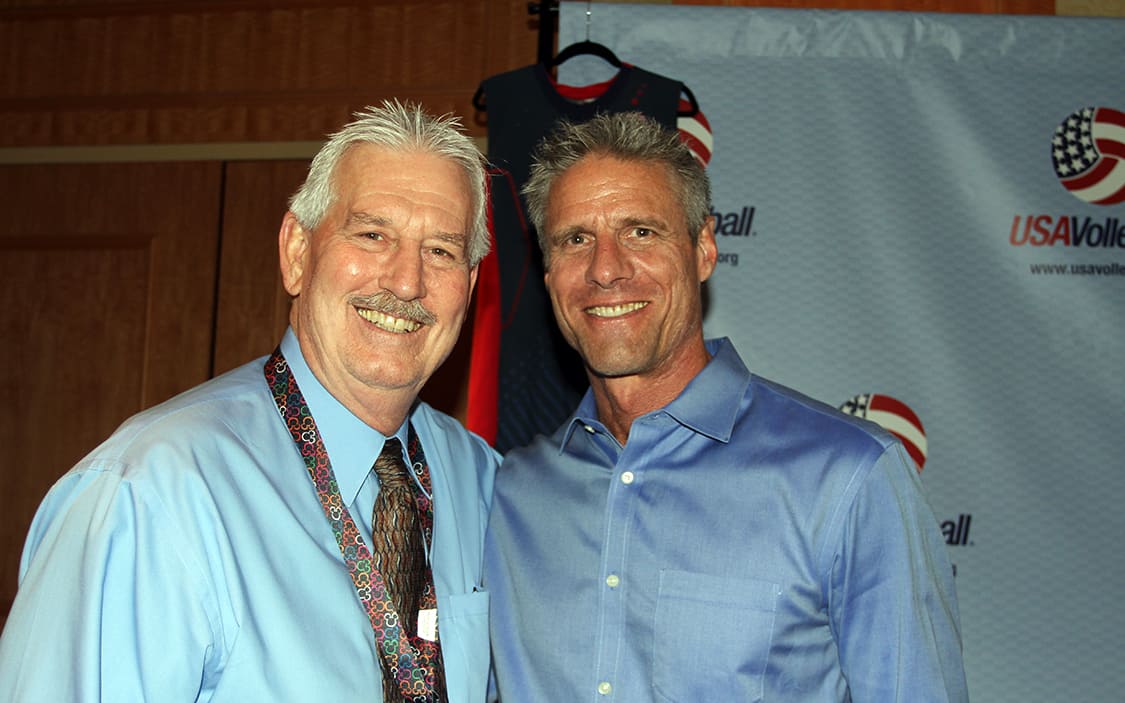
Kerry Klostermann, left, with Karch Kiraly at the 2012 FIVB World Congress
COLORADO SPRINGS, Colo. (Aug. 3, 2020) – What started during a break from surfing turned into the career of a lifetime for Kerry Klostermann.
Klostermann retired as USA Volleyball’s secretary general this month after 42 years with the organization.
Among the highlights of his career were witnessing the U.S. win its first ever volleyball Olympic medals in 1984, the debut of beach volleyball at the 1996 Atlanta Olympic Games and the success of the U.S. Women’s Sitting Team, which won Paralympic gold in 2016.
But before he witnessed all that, Klostermann was a college student and basketball player at UC San Diego who took a break from surfing with a friend in 1968 and watched some beach volleyball.
“They were good players,” Klostermann remembered. “We watched for a while and it looked really amazing. My friend and I picked up an unused beach volleyball and started batting it around.”
Klostermann enjoyed volleyball so much that he tried out for the UCSD men’s volleyball team after three years with basketball.
“I don’t think anyone was hugely disappointed,” Klostermann said of his leaving the basketball team. “I was a good shooter, but I was not real quick and I didn’t jump very high.”
It was clear that volleyball was his sport when he led UCSD to the 1970 NAIA National Championship and was named MVP.
Klostermann went from San Diego to Canada to pursue his master’s and PhD in psychology. While there, he became a Canadian citizen and then a member of the Canadian National Team from 1974 through 1976 and competed in the 1976 Montreal Olympic Games.
He later coached Canada’s Men’s Junior National Team and its Women’s National Team in Toronto.
“I was up there for almost nine years and really enjoyed it,” Klostermann said. “I was thinking that once I finished my doctorate, I would open a practice. I was very much considering living permanently in Canada.”
But fate had other plans as Klostermann met Doug Beal in 1977 at a coaching seminar at York University in Toronto. Beal told Klostermann about the new U.S. Men’s National Team training center in Dayton, Ohio, where he was head coach and he invited Klostermann to assist him.
“I thought he was an extremely bright guy,” Klostermann said of Beal. “He had a vision for the program. This was the first full-time training center for the men’s national team.
“Prior to 1977, the methodology was to invite 15-20 guys to a one-week camp, select the team and head out to the World Championship. Doug and Al Monaco had a vision to say ‘hey, we’re not going to get better unless we commit to a full-time program.’”
When the U.S. Men did not qualify for the 1980 Olympic Games in Moscow, which the United States would go on to boycott, Klostermann’s role changed and in 1981, he found himself back in San Diego where the Men’s National Team had set up their new headquarters.
Klostermann’s role was general manager and among his accomplishments was setting up jobs for the athletes at local businesses.
“The program paid them a full-time salary, but allowed them time off to train and travel,” Klostermann said. “These were high-quality companies. The athletes were placed in areas they were interested in pursuing when they were done playing volleyball.”
The Women’s National Team joined the Men in San Diego in 1985. Both programs moved to Colorado Springs in 1989 and Klostermann went too in the role of senior director. He served as executive director from 1997-2002 before moving into his final role as secretary general.
Besides watching U.S. teams win medals, Klostermann also enjoyed his time organizing the FIVB World Congresses that were held in 1996 in Atlanta and in 2012 in Anaheim as well as staging the first and only Olympic Trials for beach volleyball that qualified two teams per gender for the Atlanta Olympics
He was also a key part of USA Volleyball’s governance reform in 2008.
“That was a step forward for USAV,” he said. “It was largely mandated by the USOPC. The Board went from 32 to 12 (at that time). I think that helped quite a bit from a governance standpoint.”
Klostermann was in charge of sponsorship development from 1977 to 2017, which resulted in a number of long term partnerships with companies such as Molten, Sport Court and Hilton Hotels.
“Overall, going to work each day was something I looked forward to. It wasn’t a job.”
Klostermann is not sure what the future might hold. His old friend and co-worker Doug Beal retired as CEO of USA Volleyball in 2016 and is now on the Board of Directors for USA Surfing. Despite Klostermann’s fondness for the sport, he does not plan to follow Beal.
“I hope at some point or at some level to stay involved in volleyball from a volunteer standpoint,” he said. “It is in my blood. It is part of my DNA after 42 years. I would like to give back wherever I can.”

